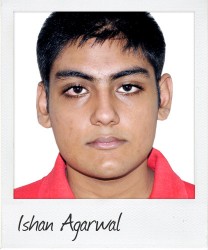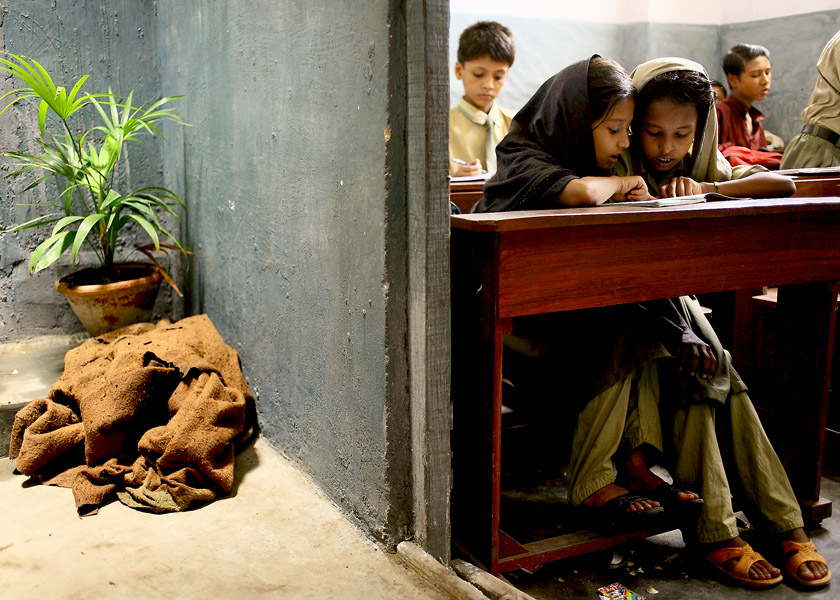“The story of Salma’s path to education”
September 30 Being a peer educator for disadvantaged students proved to be an inspirational experience for Ishan Agarwal, 20, a Correspondent from Kolkata in India, who describes an unforgettable pupil.
Being a peer educator for disadvantaged students proved to be an inspirational experience for Ishan Agarwal, 20, a Correspondent from Kolkata in India, who describes an unforgettable pupil.
Eleven year old Salma had probably realised that education was her only way to emancipation, to get out of the sordid mess her life had become.
Being forced by her father to clean utensils at the roadside tea shop, she barely earned ten rupees a day.
She decided to liberate herself with education.
When she first expressed the desire to enrol at school, she faced stiff opposition. For her parents, sending their daughter to school was a waste of time; a lost opportunity to work and earn instead.
For them, getting the ten rupees that Salma earned was far more important than her attending school, as it kept the kitchen fires burning.
Her father’s words said it all, “what is the point of sending her to school? At the end she will go and do the same work she is doing now. She will only waste her time and in the process we will have to starve.”
Poverty had forced Salma to become more of a commodity, and less of a daughter to her parents. They looked upon her as a source of income, a working hand, which would help sustain their half-filled bellies.
Education, or even the thought of it, had still not penetrated this segment of society. They lived life on a daily basis. In such an environment they did not think – nor care – about their future.
The fact that Salma enrolled herself in the free school for slum children was an achievement by itself.
When I first met her as a peer educator, teaching slum children, she did not speak but her moist eyes, “those little pools of eternal want”, conveyed to me all her dreams and aspirations, and forced me to have a “momentary but meaningful dialogue with my heart”.
At that very moment, I decided to help her reorganise her life.It did not take me long to develop this passion.
So infectious was her innocence, so intoxicating her zeal for life, so exhilarating her dogged determination that any one being in touch with Salma and her friends would willingly leave everything to help them.
I taught Salma and many of her friends for more than a year and a half, and ultimately she got enrolled in a free mainstream school.
Now she regularly goes to school, and has learnt tailoring.
She still may not be earning much, but it is far more respectable than the demoralising ten rupees she earned daily at the roadside shop.
Her eyes still remain moist, but they convey her hope and the resultant joy of living a dignified life, just like yours and mine.
Nothing has given me greater satisfaction, or contributed more in my intellectual development than my being a peer educator.
This has been my life’s most significant learning experience, because I learnt from life itself, rather than the lifeless pages of a textbook. The young students have taught me about “human resilience and about the reckless human defiance that comes about when you have nothing to call your own”. I became a Peer Educator out of my sense of duty rather than any strong passion involved.
Little did I know that this was going to become perhaps the biggest intellectually stimulating experience of my life.
The two years that I have spent as a peer educator, teaching slum children, has aroused my child-like curiosity and stimulated and nurtured my intellect, compelling me to discuss, explore and experiment in my quest to acquire knowledge.
Salma has been my heroine, and will remain so all my life.
She is my favourite – an example I use to motivate others to break the shackles of poverty and empower themselves with the tool of education.
The measure of success of my activity can truly only be taken by the tremendous joy and satisfaction I derived when Salma walked into formal school to empower herself with education.
Perhaps it will also benefit the few people I reached as a peer educator, to come forward and help the downtrodden, the deprived, the discriminated and the oppressed.
………………………………………………………………………………………………………………………
About me: I am presently a student at the iconic Indian Institute of Science, Bangalore, India, pursuing a Bachelor of Science degree.
I intend majoring in Mathematics with Computer Science and Quantum Physics as electives, and thereafter pursue either a MS or PhD degree.
I aspire to one day be able to use the superior power of analytics to transform lives and make the world a better, easier and friendlier place for everyone to live in.
photo credit: Sharing to Learn via photopin (license)
…………………………………………………………………………………………………………………………
Opinions expressed in this article are those of the author and do not necessarily represent the views of the Commonwealth Youth Programme. Articles are published in a spirit of dialogue, respect and understanding. If you disagree, why not submit a response?
To learn more about becoming a Commonwealth Correspondent please visit: http://www.yourcommonwealth.org/submit-articles/commonwealthcorrespondents/
…………………………………………………………………………………………………………………………




